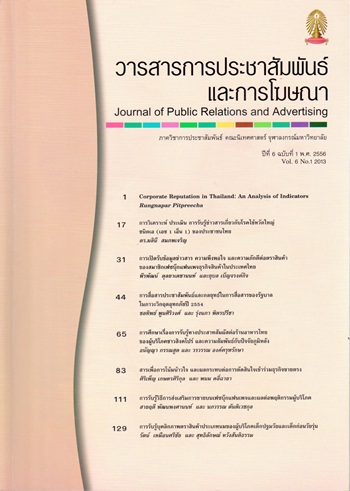CORPORATE REPUTATION IN THAILAND : AN ANALYSIS OF INDICATORS
Main Article Content
Abstract
This research, “Corporate Reputation in Thailand: An Analysis of Indicators”, examines indicators to measure reputation for 16 different industries, in four major sectors: consumer goods and services, health care, tourism and manufacturing. Focusing on Thailand’s private sector, the study’s objectives are to determine what indicators consumers of these industries’ products and services as well as the public in general use to determine their attitudes towards different businesses and companies. A quantitative method was employed in which a sample of 2500 persons completed a survey questionnaire. The sample includes respondents from Bangkok and provinces representing the country’s four regions: Central – Chonburi; Northern – Chiang Mai; Northeastern – Nakhorn Ratchasima; and Southern – Songkhla.
The Rep-Trak® Scorecard with 23 attributes, divided into seven factors and four characteristics was employed. The data from these standardized Rep-Trak® Scorecard developed by the Reputation Institute were analyzed using SPSS for Windows. The data in- cluded descriptive statistics, including number, percentage, mean and deviation, and inferential statistics for multiple regression.
Research results showed that the businesses with a strong positive reputation displayed, or reflected, four characteristics: esteem, admiration, trust, and liking. All of the businesses had esteem as their highest characteristic indicator except fashion and clothing, which had liking ranked the first. The results also found that the most important indicators for measuring business reputation in Thailand were products and services. The other indicators were likely to have less influence on a business reputation and good governance showed no influence on a business reputation in Thailand in this study of 16 differ- ent industries. The respondents all showed different attitudes in the answers about the industries.


